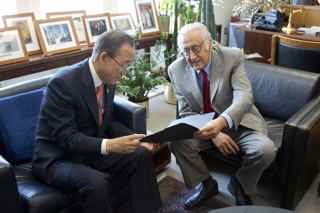 (CNN) -- After 19 months of incessant violence, the Syrian government has agreed to a cease-fire during the four-day Eid al-Adha holiday, which begins Friday, special envoy Lakhdar Brahimi said.
(CNN) -- After 19 months of incessant violence, the Syrian government has agreed to a cease-fire during the four-day Eid al-Adha holiday, which begins Friday, special envoy Lakhdar Brahimi said.
The U.N.-Arab League special envoy added that some rebels have also "agreed to the principle" of a cease-fire.
But whether the words lead to any kind of peace remains uncertain. Even the Syrian government seemed to be short of an official position.
Foreign Ministry spokesman Jihad Makdissi said that from his perspective, nothing is set in stone.
"The issue of halt(ing) the military operations during the Eid al-Adha holiday is still under study by the general command of the military and the armed forces," Makdissi told CNN Wednesday. "A final decision will be issued tomorrow in this regard."
A prominent opposition group said it has no faith President Bashar al-Assad's forces will follow through with a cease-fire.
"Based on our long experience in dealing with the Assad barbaric regime, we know that the Syrian government is just buying time and playing on words," said George Sabra, spokesman for the Syrian National Council. "The whole world knows that the Syrian regime cannot be trusted and doesn't have any credibility in fulfilling any promise that they make to anyone. ... The crisis is too complicated in Syria, and the Assad regime is trying a diversion."
The Syrian government has previously vowed to withdraw its forces, but the bloodshed only surged across the country. .
Earlier this year, the government agreed to a six-point peace plan laid out by Brahimi's predecessor, Kofi Annan. But violence by both troops and rebels raged on.
Sabra said the rebel Free Syrian Army is willing to agree to a cease-fire under certain conditions.
"We announced along with the FSA that the opposition is ready to comply by the cease-fire on the condition that the Syrian regime doesn't try to take advantage of the momentum so they can gain more territories and prepare to launch more attacks to kill our innocent civilians," Sabra said.
But for every day that talks drag on, reports of deaths mount by the dozens or hundreds.
Opposition activists say more than 30,000 people -- mostly civilians -- have been killed in Syria since March 2011.
In other developments:
Reports of fresh carnage on the ground Wednesday did little to support the notion of an imminent cease-fire.
Both dissidents and government forces blamed each other for a "massacre" in the city of Douma.
The opposition Syrian Observatory for Human Rights said at least 16 bodies, including some children, were found. Activists blamed the attacks on government forces, the observatory said.
Syrian state-run media gave a different account:
"Terrorist armed groups committed a heinous massacre in the city of Douma, resulting in the killing of nine men, three children and one woman -- all slaughtered by knives," state TV reported.
Refugee crisis mounts in Jordan
The hundreds of thousands of Syrians who have fled across borders can sleep without fear of further attack. But they're also causing serious strains on their host countries, such as Jordan.
Providing health care to "the Syrian brothers" has drained resources and put enormous pressure on Jordanian hospitals and clinics, Minister of Health Abdullatif Wreikat said, according to Jordan's official Petra news agency.
He said Jordan, Syria's southern neighbor, now has more than 200,000 refugees and needs more aid.
Wreikat said the kingdom has made significant strides in fighting contagious diseases, but fears a decline "as some diseases had spread among the Syrian refugees," Petra reported.
The Health Ministry has provided 50,000 doses of vaccines against diseases to Syrian children at the Zaatari refugee camp, in addition other health services, a ministry official said, according to Petra.
™ & © 2012 Cable News Network, Inc., a Time Warner Company. All rights reserved.
Portland and Seattle
Free Subscription to Breaking News
Free Subscription to Breaking News





















































































































































































































































































































































